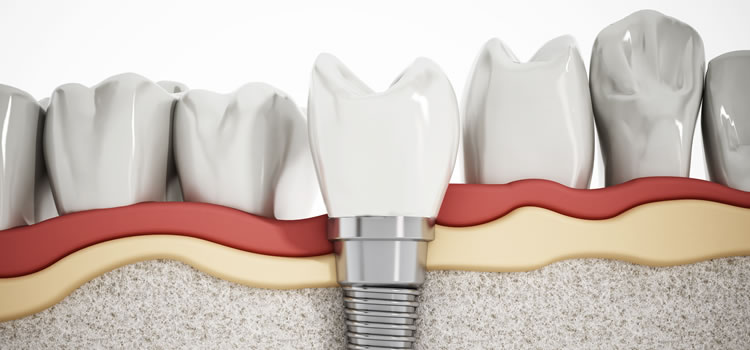- Home
- How long do dental implants last?

Welcome to Perfect Pearls Dental Practice, where we strive to ensure your smile is as radiant as pearls. Today, we are here to delve into one of the most popular and transformative dental procedures – Dental Implants.
One of the most common questions we receive is, “How long do dental implants last?” Let’s uncover the layers to this question in this blog post, and discuss the benefits of getting dental implants.
What are dental implants?
Millions suffer from tooth loss due to decay, gum disease, or injury. The absence of teeth can significantly impair function and aesthetics, affecting one’s ability to chew food properly and smile confidently. It is a daunting experience, leaving many searching for a lasting solution.
Enter Dental Implants! Dental implants serve as a permanent solution to missing teeth, providing a strong, stable foundation for artificial teeth. These marvels of modern dentistry integrate seamlessly with the jawbone, acting as a new root for the replacement tooth and delivering a natural look and feel.
How long do dental implants last?

Not only do dental implants resolve the pain points associated with missing teeth, but they are also renowned for their durability and longevity. With proper care and maintenance, dental implants can last for 25 years or more. In many instances, they are a lifelong solution, alleviating the distress and inconvenience of tooth loss permanently. This longevity ensures uninterrupted smiles, the freedom to enjoy all types of foods, and renewed self-confidence.
However, the lifespan of dental implants depends significantly on various factors:
- Oral Hygiene:
Maintaining optimal oral hygiene is paramount. Regular brushing, flossing, and professional cleanings help in preventing infections and diseases around the implant area, thus extending the lifespan of the implant.
- Lifestyle Choices:
Healthy lifestyle choices, such as a balanced diet, limited alcohol consumption, and abstaining from smoking, contribute positively to the longevity of dental implants. Smoking, in particular, can compromise blood flow to the gums and can impair the success of implants.
- Regular Dental Check-ups:
Routine check-ups and professional cleanings allow for early detection and management of any potential issues, ensuring the longevity of the implant.
- Quality of Material and Procedure:
The quality of the implant material and the expertise of the dental professional play critical roles in determining how long the dental implants will last. At perfect pearls dental practice we use quality products, biocompatible materials with evidence based, up-to-date procedures to ensure the longevity of your implants.
- Location of the Implant:
Implants in the back of the mouth receive more strain from chewing, which can lead to faster wear and tear. However, with proper care, they can still last many years.
Tips for maintaining your dental implants
- Brush and Floss Regularly: Use a soft-bristle toothbrush and non-abrasive toothpaste to avoid scratching the surface of the implants.
- Avoid Hard and Sticky Foods: Opt for a balanced diet and try to avoid excessively hard or sticky foods that might damage the implants.
- Wear a Mouthguard: If you play contact sports or grind your teeth at night, consider wearing a protective mouthguard.
- Regular Dental Visits: Schedule regular visits to your dentist for professional cleanings and check-ups.
Living with missing teeth can be a continuous struggle, affecting not only oral health but also overall well-being and quality of life. It can lead to diminished self-esteem, altered speech, nutritional deficiencies due to eating restrictions, and can even impact social and professional interactions. The emotional and physical toll can be overwhelming, making the pursuit of a reliable remedy crucial.
At Perfect Pearls Dental Practice, we pride ourselves on providing high-quality dental care, ensuring your dental implants are placed meticulously and maintained adequately, promising a lifetime of radiant smiles.
For personalised advice on dental implants or to schedule an appointment, get in touch today. Our dedicated team is here to guide you through every step of your dental journey and help you maintain your smile’s brilliance.
- Home
- Does Dental Implant Treatment Hurt?

The chances are that like most people, if you hear the word dentist you immediately think pain and discomfort. You may have had a bad experience in the past with toothache or had a tooth extracted. You may have simply heard one too many horror stories about everybody else’s. Although a dental emergency may be painful and require a visit to the dentist, the truth is that with the modern techniques and advanced training of dentists today, it is rarely the procedure itself that is painful.
Regardless, we tend to avoid going to the dentist because of our nature as humans. Even when it is in our best interests. This is especially true of dental implants. If you are suffering from missing teeth and have been considering dental implants, but have found yourself worrying about whether or not the treatment hurts, do not fear – you are not alone. Let’s take a closer look at the process and help to put your mind at rest.
Why get dental implants?
Dental implants are a permanent solution to missing teeth. Unlike other options, they do not have an impact on your remaining, healthy teeth. They provide you with the most stable and natural looking replacement. They also help to strengthen the jaw by replacing not just the missing tooth but also the root.
Apart from the obvious visual implications of missing teeth, which can severely undermine our confidence and sense of self-esteem, there are also hidden dangers of missing teeth. Over time, these can cause more problems. This can include weakening of the bone which can lead to damage or failure of other teeth and a receding jaw – which often has the effect of causing us to look older than we are. This happens because when we chew, our teeth help stimulate the bone below and keep it in a healthy condition. If a tooth is missing, this does not happen and the jawbone gradually begins to deteriorate.
As well as helping you to look and feel great again, dental implants are a great way to protect yourself from the chances of such problems arising.
How do dental implants work?
Dental implants are actually comprised of three elements, known as the implant, the abutment and the crown.
It is the implant that plays the most important role, as this helps to restore strength to the jaw as well as forming a strong base upon which the new tooth – the crown – can be mounted.
A dental implant is made of high-quality titanium, which is biocompatible. This means that it has the special property of being able to bond and fuse with the natural bone around it. This means that it becomes an integral part of your jaw.
Once the implant is fully bonded, the abutment can be fitted, and finally the crown – and your smile is restored.
What does the fitting process look like?
After your initial consultation and any preliminary treatment, the actual process of fitting your dental implants typically has four main stages.
The first step is to numb the gum with anaesthetic. A surface anaesthetic is used first to freeze the gum. This allows the local anaesthetic to be injected without you feeling anything. Once this anaesthetic has started to work, you will not feel anything at all.
Once this first stage is ready, the next step is to prepare the site for the implants. The dentist will need to make a small opening in the gum in order to gain access to the bone.
The dentist will then drill what is known as a pilot hole. This allows the dentist to check that the position and angle are correct. The hole will then be gradually widened to the correct width for the implant to be inserted.
Finally, the implant can be screwed into place and sealed off, and the gum around the area stitched.
It is important to remember that the entire process is a planned, precision procedure. Don’t think of it as something like a tooth extraction or other emergency treatment.
What about recovery?
As with any dental treatment, everybody’s experience is different. However, the vast majority of patients state that they feel nothing more than mild discomfort afterwards, most often during the healing stage. They are often pleasantly surprised by the lack of any pain during the procedure itself.
In order to keep you feeling comfortable, your dentist will prescribe painkillers and a special mouthwash for use after your implant procedure and go through what you need to do to ensure quick and successful recovery. Of course, we’ll never be more than a phone call away should you have any questions or concerns.
It will also be necessary to return about a week after treatment to have the stitches removed, although this will also be done painlessly.
Why wait for your perfect smile – call us today
If you are interested in dental implant surgery and would like to find out more or book your initial consultation, don’t hesitate to call the expert team at Perfect Pearls today on Wolverhampton 01902 500 823. Alternatively, see more ways to get in touch online.
- Home
- All You Need to Know About Dental Implants

Whether your dentist has just mentioned them for the first time, or if they are something you have been considering for a while, the chances are you have questions about what exactly they are and how the procedure works. In this article, we answer some of the most common questions about this increasingly popular treatment.
What are Dental Implants?
A dental implant is a titanium screw that is used to replace the root of a tooth when it fails and support one or more false teeth. It is placed into the jawbone just like the original root, and offers a secure and safe way to get back your smile. They can be used to secure anything from a single tooth to an entire bridge.
Can Anybody Have Implants?
Generally speaking, implants are suitable for the majority of patients. The treatment does, however, rely on the condition of the bone in the jaw, so a thorough investigation must be conducted for any individual wishing to get implants. This will involve a dentist carrying out special tests to see if there is enough bone, and if it is in good enough condition.
What if I Don’t Have a Suitable Jaw?
If there is not a sufficient amount of bone or if health issues are identified, it may still be possible to place implants. In this situation, however, a bone graft may first be required. This involves either taking some donor bone from adjacent areas or using bone from other sources and placing it in the deficient area. After a few months, the bone will bond sufficiently with the surrounding bone to support the implant.
Does Having Dental Implants Fitted Hurt?
As with any dental procedure, there is never a guarantee that you won’t experience pain. However, the process of fitting implants is usually conducted under local anaesthetic and in most cases can actually be easier and less painful than a tooth extraction. You will, like with an extraction, feel discomfort in the week following the procedure, but most patients say that the benefits far outweigh any discomfort.
How Long Does it Take?
The time required to complete dental implant surgery varies from person to person, but on average the work is completed within three to four months. This is because once fitted, the jaw bone needs to grow around the implants to fuse them into place before teeth can be supported. If your dentist feels that the implant is stable enough, he or she may be able to fit the replacement teeth sooner. It is important to remember that patience is the key to a successful outcome, so you should always trust your dentist’s judgement.
I’ve Got My New Teeth – What’s Next?
For implant surgery to be fully effective and leave you with a lasting smile, it is important to follow your dentist’s guidelines and properly look after your implants. This means that it is very important to keep them properly clean and visit your dentist for regular check ups – just as you normally would. Treat them with the same respect you would your natural teeth and you should have a lasting smile.
Perfect Pearls dental team specialise in providing high quality dental treatment at affordable prices. To get in touch and learn more about low cost dental implants call us now on Wolverhampton 01902 500 823. Alternatively, enquire online now and a member of the team will contact you shortly.
- Home
- A new way of fixing dental implants
It has been an exciting few months here at Perfect Pearls. .
With implants fast becoming the popular choice for many people wanting to replace missing teeth we are constantly looking ahead to improve our services.
We are very proud to have started offering new screw-retained implants to customers.
The new type of implant, which involves the crown being screwed into the gum rather than attached to a metal abutment has lots of benefits.
They are much easier to clean and maintain and the crown can be easily removed without damage if the implant fractures or loosens over a period of time.
It is also great news for people with ill-fitting implants as the screw mechanism makes it much easier for them to be straightened and corrected.
We have always prided ourselves on offering high quality implants at low cost and with this new mechanism for fixing implants we feel customers are getting even higher quality at the same affordable price.
We are just one of a handful of clinics in the UK to be testing the new mechanism and so far the results are extremely positive.
For more information on Perfect Pearls or to book a free consultation contact 01902 500 823









